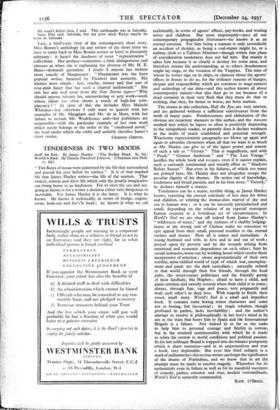TENDERNESS IN TWO MOODS
" THE floors of ocean were patterned by the life that surrendered and passed for ever below its surface." It is of that marked life that James Hanley writes—the life of the seaman. That violent, remote and divot life which only the greatly imaginative can bring home to us landsmen. For to elect the sea and sea- going as theme is for a writer a decision either very dangerous or inevitable. For James Hanley it is the latter. It is what he knows. He knows it technically, in terms of bridge, engine-
room, look-out and foc's'le head; he knoWs it what we call
realistically, in terms of agents' offices, pay-books, and waiting wives and children. But most importantly aceall our contemporary propagandist litterateurs,-he knows it as an eternal emotion. For him being a seaman is only secondarily an accident of destiny, as being a coal,miner might. be, or a railway clerk or a Cabinet Minister—though within that plane of consideration tenderness does not fail him. But mainly it takes him because it so clearly is destiny for some men, and therefore storms his understanding, as to others drunkenness might lay siege, or the vocation of the Trappist. The men of whom he writes sign on in ships, or clamour about the agents' offices in frenzy to do so, for the ordinary reasons of hunger, despair and responsibility which are common to wage-earners and underdogs of our time—and this author knows all about contemporary misery—but also they go to sea because of a dead certainty in their very flesh that they must do that or nothing, that they, for better or worse, are born seamen.
The stories in this collection, Half An Eye, are very uneven, and are gathered without a sufficient selectiveness from the work of many years. Ponderousness and elaboration of the obvious are recurrent menaces to this author, and the staccato method into which he lapses so often is positively depressing to the sympathetic reader, so patently, does it declare weakness in the midst of much established and potential strength. Wearisome expressionistic paragraphs are blown up again and again to advertise cleverness when all that we want is as 'much as Mr. Hanley can give us of the legato power and sorrow of such a tale as " Victory." This is magnificent, and with " Feud," " Greaser Anderson " and " The Last Voyage " justifies the whole book and excuses, even if it cannot explain, such a curiously sentimental and muddy effort as " Shadows Before Sunset." But even in his failures, of which too many are printed here, Mr. Hanley does not altogether escape the peculiar dignity of his themes. He writes out of knowledge, tenderness and broad passion, and in his best story, " Victory," he declares himself a- master.
Tenderness can be a major, terrible thing, as James Hanley knows, reporting the eternal solicitude of lost men for wives and children, 'or relating the immaculate 'marvel of sky 'and sea to human woe ; or it can be intensely particularised and small, depending on the relation of an especial transigent human creature to a fortuitous set of circumstances. In -.-World's End we are shut off indeed from James Ilanidy's wilderness of water," and the inmates of a shabby lodging- house at the wrong end of Chelsea make no conscious or epic appeal from their small, personal troubles to the eternal verities and ironies. Here all is minor and immediate; A young husband and wife, in love and in and out of work ; preyed upon by poverty and by the wounds arising from emotional and economic dependence on each other.; hurt by casual jealousies,worn-out by working hours which render them inexpressive of emotion ; aware unpretentiously, of their own terrible,- mine-riddled world of 1936 of which war, unemploy- ment and panic are the dark custodians ; naturally related to that world through their few friends, through the local pubs, the street-corner politicians and the friendly gossip of their landlady, Ma Hogben ; afraid to have a child, and panic-stricken and sweetly content when their child is to come ; always, through fear, rage and peace, very poignantly and truly each other's in deep love. With tragedy to finish their sweet, small story. World's End is a small and imperfect book. It contains some boring minor characters and some not so boring, but inessential ;. its tragic solution, though profound in pathos, lacks inevitability ; and the author's attempt to 'resolve it philosophically in her hero's mind as he sits in the train that bears him to Spain and the International Brigade is a failure. Not indeed in so far as she seeks to help him to personal courage and fidelity in sorrow, but in the strained sentimentality with which he is made to relate his sorrow to world conditions and political passion. In his last soliloquy Brand is trapped into- doctrinaire pomposity which is sheer nonsense—and in so unpretentious and true a book, very, deplorable;. But even this brief collapse is a mark of authenticity--for no true writer can forget the significance of the drums of Fortinbras, and we know that in art the attempt' must be made to resolve tragedy. Wherefore for its authenticity even in failure as well as for its manifold successes of comedy, pathos, emotion and true, modest verisimilitude, World's End is earnestly commended, -
KATE O'BRIEN.


































 Previous page
Previous page